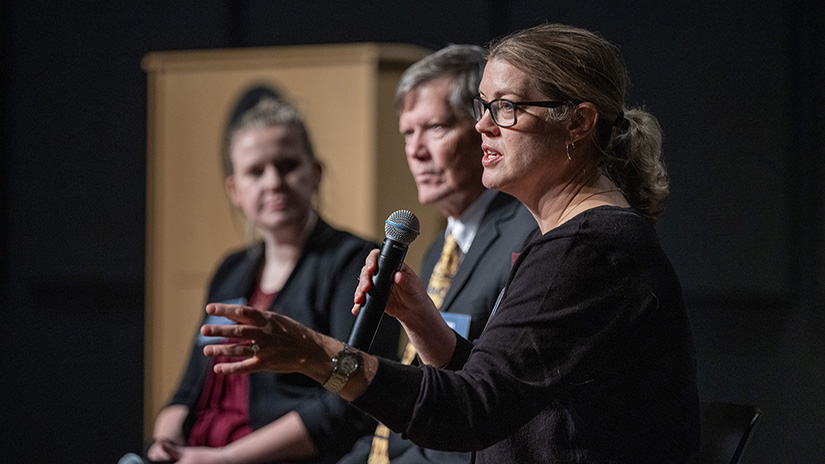UNIVERSITY OF WISCONSIN River Falls
Newsroom

Cari Redington, right, administrator of the Wisconsin Department of Revenue Research and Policy Division, speaks about workforce issues Tuesday at UW-River Falls as John Koskinen, center, chief economist with the Department of Revenue, and Emily Kovach-Erickson, left, with the River Falls Chamber of Commerce and Tourism Bureau, listen. The three were speakers at The Workforce Summit: Western Wisconsin’s Labor Market Future. UWRF photo.
Speakers at UW-River Falls discuss economic challenges
Creative, diligent approaches needed to address worker shortage, other issues
Oct. 31, 2023 - The economy in western Wisconsin has rebounded well from the downturn caused by the coronavirus pandemic, but solutions must be devised to address such challenges as an ongoing worker shortage and affordable housing for the region to continue to prosper financially, speakers said Tuesday at a workforce summit at the University of Wisconsin-River Falls.
The St. Croix Valley is doing well economically, speakers said, as many businesses have bounced back from the pandemic. That success is visible in numerous ways, from strong new business startups to the fact that St. Croix County is the second-fastest growing county in Wisconsin, trailing only Dane County.
However, sustaining that growth could prove challenging amid fast-changing factors that include artificial intelligence, said Brent Orrell, senior fellow at American Enterprise Institute and a keynote speaker at The Workforce Summit: Western Wisconsin’s Labor Market Future. Doing so will require creative approaches and an ability to change quickly, Orrell told attendees, co-sponsored by Family Friendly Workplaces and the River Falls Chamber of Commerce and Tourism Bureau.
Given current economic challenges, “We have to be thinking all of the time about how to adapt,” Orrell said. “How do we, in the face of change, become a more resilient economy?”
Doing so will require a multifaceted approach, Orrell said, and will require people being open to learning new skills. Developing interpersonal skills also will be necessary, he said.
“Retraining is going to be a part of life,” he said.
Summit speakers described how businesses are taking creative approaches to retain and attract employees amid an ongoing worker shortage. Some said they are offering enhanced benefits to help with childcare and healthcare expenses. Others said they are part of discussions with local governments and others to determine how to create more affordable housing for employees. Still others described the importance of addressing workers’ mental health.
Working to find solutions to those issues and others is anything but easy, said Abby Klatt, human resource director at OEM Fabricators, a custom metal fabrication company in Woodville. But attempting to do so is part of overcoming challenges facing workers and employers, she said.
“Healthcare is difficult. Daycare is tough,” she said. “We have to be willing to make changes, to take feedback and say ‘how can we do this better?’”
Mike Orth, dean of the UWRF College of Agriculture, Food and Environmental Sciences, said taking steps to address a worker shortage is vital, especially in rural areas that have been losing population to urban sites.
“Finding ways to attract people to this region and provide them with what they need to keep them here will be an important part of continuing to build our economy,” he said.
The summit offers attendees an opportunity to not only learn from others about workplace challenges they face but to discuss potential solutions, said Neil Kline, executive director of Family Friendly Workplaces, an organization that works to address western Wisconsin’s workforce shortage and strengthen the region’s families. Such issues as a lack of affordable housing and childcare are “significant challenges” that will require ongoing efforts to address, he said.
“We have recovered from the pandemic in many ways,” Kline said. “But we have workforce issues to deal with that are not going to go away, and we need to decide what we are going to do about them. Hopefully today served as a means of getting us closer to having some of those answers.”











